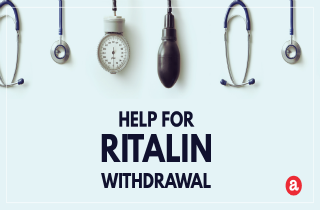Do you need help for Ritalin (methylphenidate) withdrawal?
You’ve found the right place. Here, we’ll review the dangers that occur when you stop taking Ritalin, the main symptoms of Ritalin withdrawal syndrome and options for treatment. Plus, we invite you to ask your questions about Ritalin withdrawal in the comments section at the end.
Is Ritalin withdrawal dangerous?
Yes. Ritalin (methylphenidate) withdrawal can be dangerous. Even if you’ve been taking Ritalin as prescribed. Why? Because withdrawal from Ritalin following chronic therapeutic use may unmask symptoms of the underlying disorder that may require follow-up. Plus, Ritalin withdrawal is even more dangerous if you’ve been taking it OTHER THAN prescribed. Careful supervision is required during withdrawal from Ritalin following Ritalin abuse (using Ritalin to get high) because severe depression may occur. Furthermore, methylphenidate abuse itself has been associated with binge use, psychotic episodes, cardiovascular complications, and severe psychological addiction.
For these reasons, experts recommend that you withdrawal from Ritalin under medical supervision. Hospital treatment is indicated for people over the age of 65, with certain medical conditions*, those who have a very high tolerance for Ritalin or who developed seizures, delirium or psychosis during a previous withdrawal. Otherwise, if you meet criteria for outpatient detox from Ritalin, it’s possible that you go through withdrawal from Ritalin at home, as long as you schedule regular physician monitoring with a supervising doctor.
Ritalin withdrawal methods: help for Ritalin withdrawal symptoms
How long until Ritalin withdrawal starts? A few hours after the effects of Ritalin have worn off. Stimulant withdrawal syndrome is characterized by:
- anxiety
- depression
- exhaustion
- headache
- hypersomnia (excessive sleeping)
- fatigue
- irritability
- poor concentration
- restlessness
- suicide attempts (severe cases)
Just as with any kind of stimulant, when you use Ritalin daily for a period of more than a few weeks, you can experience withdrawal symptoms when you lower dosage or stop taking Ritalin totally. In fact, doctors expect withdrawal symptoms to occur with the acute withdrawal phase from Ritalin, which usually lasts the first week after you stop taking Ritalin. The withdrawal from Ritalin addiction depends on the amount and duration of time a person was addicted to Ritalin. Some symptoms such fatigue, depression, and disturbed sleep patterns can emerge when you first stop taking Ritalin AND persist for the next few weeks or months after stopping. Plus, drug craving can be prolonged and intense during Ritalin withdrawal. So what Ritalin withdrawal methods can help ease withdrawal and minimize the discomfort of the Ritalin withdrawal period?
How to ease Ritalin withdrawal?
If you are undergoing a medically supervised detox for Ritalin, your doctor may recommend a couple of classes of drugs during this time. While no medications have been approved by the FDA for the treatment of stimulant addiction, neuroleptics may be useful in controlling stimulant-induced psychosis or delirium. Further, anticraving agents with a fast onset of action may be helpful during the early withdrawal period. Panic attacks may be treated with an antidepressant or a benzodiazepine. And during the late withdrawal phase, when depression may be present, antidepressants may be an appropriate choice for treatment. Drugs being investigated for the treatment of generalized withdrawal symptoms include adrenergic agonists and calcium channel blockers. Other ways principles to consider during Ritalin withdrawal include:
- bed rest
- diet as tolerated
- drink lots of fluids (juices)
- monitor vital signs at least once every two (2) hours
Natural help for Ritalin withdrawal
Most often, no treatment other than support is needed for the initial phase of stimulant withdrawal. However, there are some basic treatment guidelines that you can follow as you go through Ritalin withdrawal. For example, during the first few days of Ritalin withdrawal, you will need a sober and responsible family member or friend to encourage participation in a program, watch for serious signs of withdrawal, assist with medications, get you to to the physician’s office and dispose of any alcohol or drugs in your home. You can be sure to eat regularly: three (3) meals a day, with no more than 14 hours between any two meals. Other natural help for Ritalin addiction include ways to reduce doses and duration of standard pharmacotherapies. Keep in mind, however, that these possible aids for Ritalin withdrawal have not been proven effective scientifically; there currently is much research in this area.
Acupuncture for Ritalin addiction – Typically in or around the ear can help manage cravings.
Herbal treatments for Ritalin addiction – Look into the herb passionflower for its ability to manage withdrawal symptoms.
And be sure to follow this important guide: If medical problems arise, seek medical service immediately.
Helping with Ritalin withdrawal questions
Do you still have questions about managing Ritalin withdrawal? Please ask your questions here. Or let us know what has helped you in the past. We publish all relevant questions and respond to each one personally and promptly.
* Medical indications for inpatient Ritalin detox therapy include a history of recent head trauma or cerebro-vascular accident, acute abdominal pain, jaundice, liver failure, electrolyte imbalance, pneumonia, sepsis, dehydration, AIDS, arrhythmia, angina, ischemic heart disease, hypertension, severe respiratory disease









Related Posts